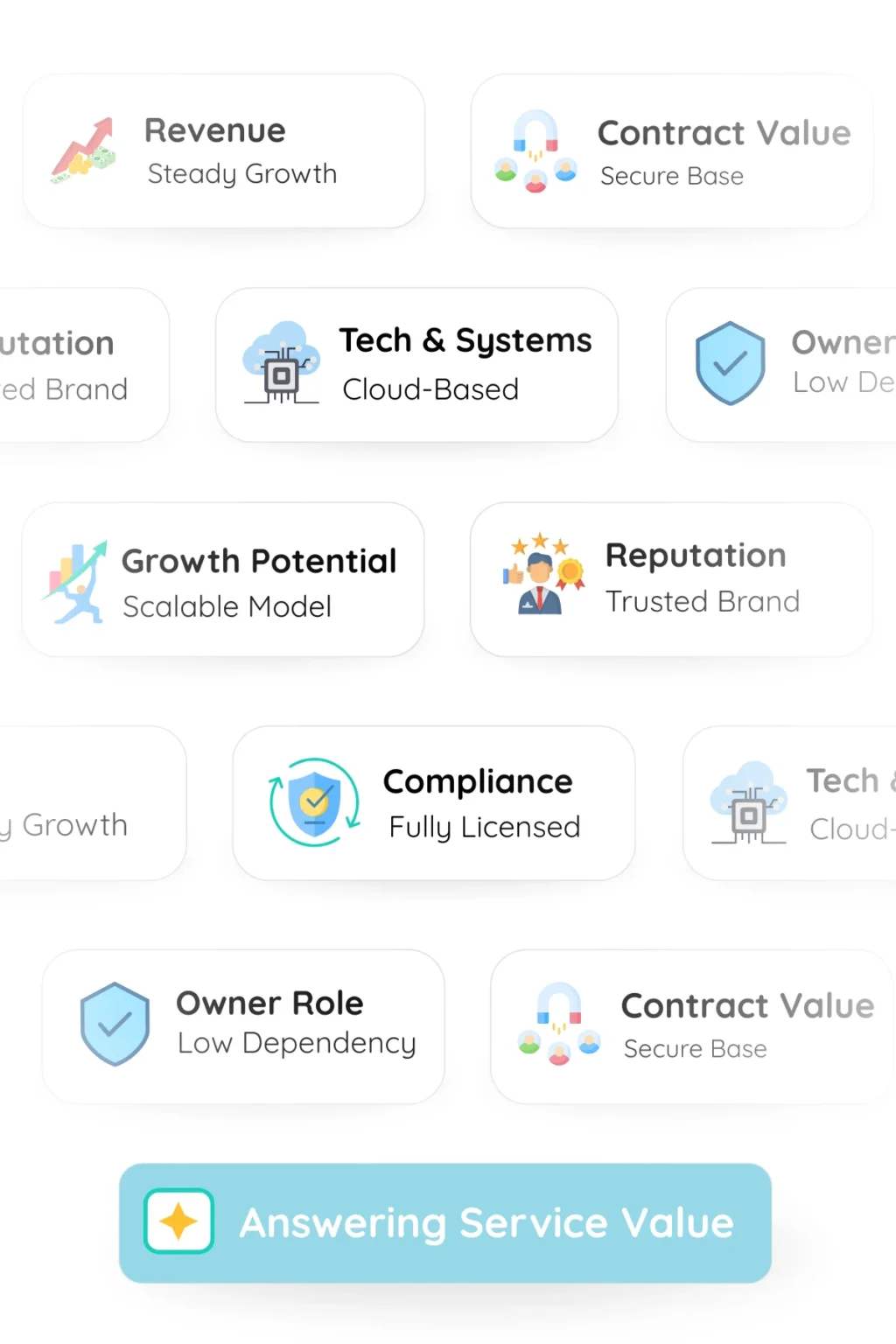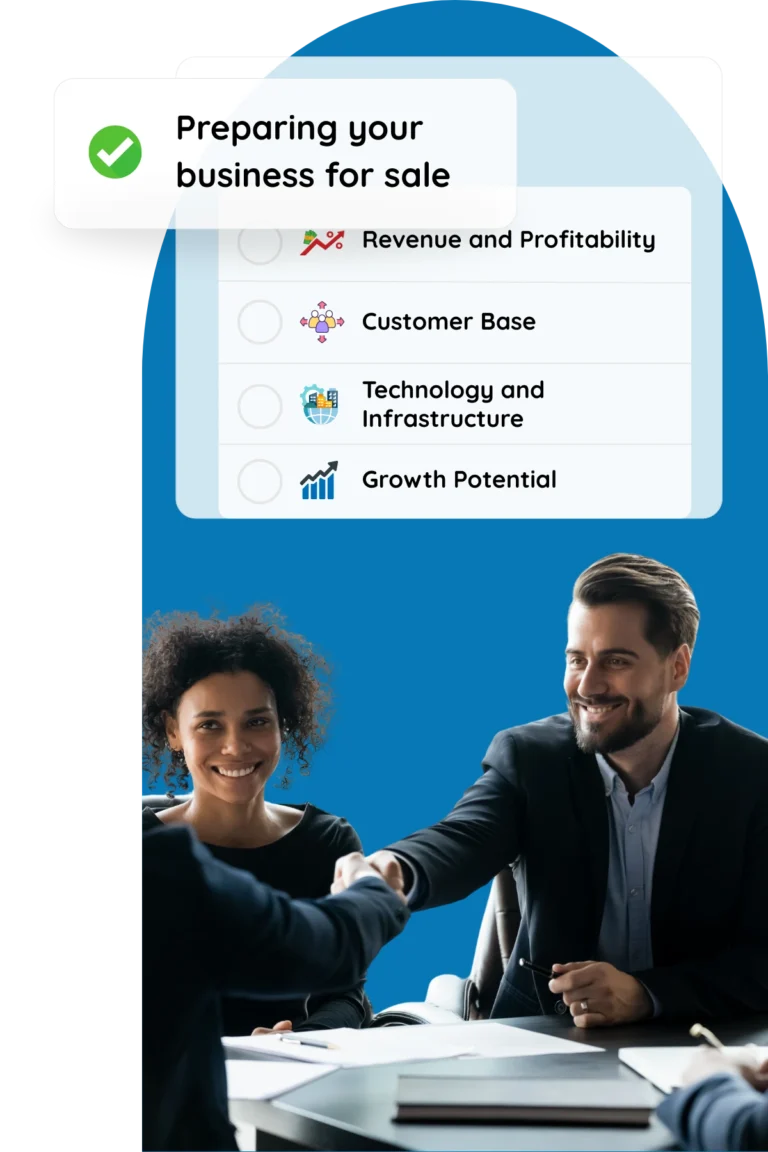How to Sell Your Answering Service

Selling an answering service business requires thorough preparation, clear financial documentation, and a structured transition plan. Buyers look for companies with steady revenue, well-established operations, and growth potential. A properly executed sale not only maximizes the value of the business but also ensures a seamless transition for employees and clients.
Whether you plan to sell soon or prepare for a future exit, taking the right steps will position your business as an attractive investment. This guide walks through every stage of the process, from valuation and preparation to finding a buyer, negotiating terms, and finalizing the sale.
1. Evaluating Your Answering Service Business’s Value
Understanding your business’s worth is the first and most critical step in the selling process. A well-researched valuation ensures that you set a competitive yet realistic price, attracting serious buyers while maximizing your return on investment. Without a clear grasp of your company’s value, you risk undervaluing your business or setting a price that deters potential buyers.

Key Factors That Determine Value
- Revenue and Profitability: Buyers look at revenue trends, profit margins, and financial consistency. A business with steady or increasing profits is more appealing than one with fluctuating earnings. Businesses that operate on a recurring revenue model (monthly service fees, contracts) are desirable because they provide financial stability for the buyer.
- Customer Base and Contracts: A diverse client base reduces the risk of losing a large client. Long-term contracts with businesses ensure recurring revenue and make your company a more secure investment. Buyers prefer businesses with stable, repeat customers over those relying heavily on seasonal or one-off clients.
- Technology and Infrastructure: Modern answering services that use up-to-date, cloud-based technology are easier for buyers to manage and scale. Your business becomes even more valuable if it uses proprietary software or integrates with major CRM and scheduling systems. Outdated or manual systems can be a red flag and may require an investment from the buyer to upgrade, which could reduce your selling price.
- Scalability and Growth Potential: Buyers are not just investing in your business today; they want to know its future potential. A company that can quickly expand by adding more clients, automating processes, or integrating with new industries will be more attractive. It increases your value if you have documented strategies for scaling, such as marketing plans or sales funnels.
A professional business valuation conducted by a financial expert or business broker can provide an unbiased perspective on what your answering service is worth. Even if you perform an internal valuation, comparing it to similar businesses that have sold recently can help ensure your price is competitive. Establishing a realistic valuation upfront prevents delays and negotiations that could derail a potential sale. Buyers like Shooster Holdings value financial transparency and scalability, and are well-capitalized, which helps ensure a smoother transaction and faster closing.
2. Preparing the Business for Sale
- Organizing Financial Records: Buyers will conduct financial due diligence before making an offer. Accurate, up-to-date financial records, including income statements, balance sheets, accounts payable and accounts receivable aging, tax returns, and customer billing reports, are a necessity. Transparency in revenue sources and expenses gives buyers confidence in their investments.
- Streamlining Operations: Documenting Standard Operating Procedures (SOPs) ensures the business runs smoothly without owner intervention. Buyers prefer businesses where key processes—such as call handling, client onboarding, and billing—are well-documented and easy to transfer. Reducing inefficiencies before selling can also improve profit margins and make your business more valuable.
- Retaining Key Staff: One primary concern for buyers is whether employees will stay after the transition. Experienced receptionists, customer success managers, and operations managers are assets to the business. Offering retention incentives or discussing employee contracts with potential buyers can ensure a stable workforce during and after the sale. Buyers with a strong internal culture, such as Shooster Holdings, understand the importance of employee retention and continuity during acquisitions. Their approach helps ease employee concerns and promotes long-term operational success.
- Reviewing Legal and Contractual Obligations: Ensure all client contracts, software agreements, and vendor relationships are in good standing. Buyers may want to verify that contracts are transferable and that no legal issues could complicate the transition. Any pending disputes should be resolved before listing the business for sale.

3. Finding the Right Buyer
Not all buyers are the same, and identifying the correct type of buyer can significantly affect how smoothly the sale proceeds. Some buyers may have industry experience and want to expand their operations, while others may be investors looking for passive income opportunities. Understanding the motivations of your buyers helps in crafting your sales pitch and setting the right expectations.
Where to Find Buyers
- Business Brokers: Working with a broker specializing in service-based businesses can connect you with serious buyers actively looking for an acquisition. They also handle negotiations and paperwork, reducing the complexity of the sale.
- Online Marketplaces: Websites like BizBuySell, Empire Flippers, and Flippa allow you to list your answering service business, giving you exposure to a broad audience. High-quality listings with transparent financials and business highlights perform best.
- Industry Networks and Competitors: Sometimes, the best buyer is already in the industry. Competitors looking to expand their market share may be interested in acquiring your business. Networking within professional associations or directly contacting industry contacts can uncover interested buyers.
- Direct Outreach: If you know of potential buyers—such as business owners who have expressed interest in expansion—you can approach them directly. An informal conversation before listing publicly can sometimes lead to a faster, smoother transaction
Choosing the Right Buyer
- Financial Capability: Can they afford the purchase price? Have they provided proof of funds or financing?
- Industry Experience: Do they understand how to run an answering service, or will they need extensive training?
- Intentions for the Business: Will they maintain and grow the business, or are they looking for a quick turnaround?
Selling to the right buyer ensures a successful transaction and a stable future for your employees and clients. While financial offers are important, evaluating the buyer’s ability to continue running the business smoothly is just as critical. Assessing buyer fit reduces the risk of a failed deal or a disruptive transition.
4. Structuring the Sale
- Industry Valuation Benchmarks: Most answering service businesses are valued based on a multiple of annual revenue rather than EBITDA. This is especially true for small to mid-sized firms, where consistent recurring revenue and client retention are more indicative of value than adjusted earnings. While larger call centers may be evaluated on EBITDA, smaller operators usually trade between 0.75x and 1x annual revenue, depending on contract stability, churn rate, and operational efficiency. Understanding how your size and structure align with these benchmarks is essential to setting a realistic and attractive asking price.
- Revenue Composition: Businesses with long-term contracts and a high percentage of recurring revenue generally secure higher valuations. If a significant portion of revenue comes from short-term clients, the business may be perceived as riskier.
- Market Conditions: Demand for service-based businesses varies. A competitive landscape with multiple buyers will drive higher valuations, while a buyer’s market may require more flexible pricing.

Asset Sale vs. Stock Sale
Asset Sale vs.
Stock Sale
- Asset Sale: The buyer acquires only specific business assets, such as customer contracts, technology, and equipment, but does not take on liabilities or legal obligations. Asset sales are more common, allowing buyers to avoid hidden risks.
- Stock Sale: The buyer acquires the entire business entity, including all assets, liabilities, and legal obligations. This structure is often preferred if the business has significant brand value, long-term vendor agreements, or tax advantages.
Choosing a Payment Structure
- Lump Sum Payment: The buyer pays the full purchase price upfront. This payment type is ideal for sellers looking for a clean exit but may limit the pool of buyers who can afford the total cost.
- Seller Financing: The seller provides financing for part of the purchase price, allowing the buyer to make payments over time. This financing expands the pool of potential buyers but carries some risk.
- Bank Financing: Buyers may use outside capital to fund the acquisition. This is often necessary for larger or more complex transactions. Types of bank and institutional financing include:
- Senior Debt: The most common form of acquisition financing, senior debt can be secured by the company’s assets and usually provided by commercial banks. It carries lower interest rates and requires strong cash flow to support repayment.
- Mezzanine Debt: A hybrid of debt and equity, mezzanine financing is subordinate to senior debt but offers lenders higher returns. It often comes with warrants or convertible equity, making it attractive to lenders and risky for overleveraged buyers.
- Private Equity: Private equity firms may fund acquisitions directly or in partnership with existing operators. They typically look for businesses with strong growth potential and are often involved in strategy post-acquisition. While also a type of buyer, PE funding is a financial mechanism for closing deals.
- Venture Capital: Less common for established answering services, VC funding may come into play if the buyer is a startup rolling up niche providers or integrating new technology. VCs are more speculative and typically require high growth potential.
- Earn-Out Agreements: The final sale price may also be based on future business performance. In this case, a portion of the payment is tied to revenue or profit targets over a defined period. This structure benefits buyers who want business continuity assurances but requires the seller to stay involved longer with some upside if the business does continue to perform.
A well-structured deal benefits both the seller and the buyer by clarifying payment terms, responsibilities, and post-sale involvement. Working with experienced buyers like Shooster Holdings, who are familiar with both asset and stock sale structures, can help streamline negotiations and reduce legal complexity.
5. Negotiating the Deal
- Client Retention: Buyers want reassurance that customers will stay after the sale. Providing data on contract renewal rates and customer loyalty helps mitigate this concern.
- Operational Complexity: Buyers may worry about how easy it is to run the business. A clear transition plan and documented processes reduce hesitation.
- Hidden Liabilities: Buyers will scrutinize outstanding debts, lawsuits, or contractual obligations. Being transparent about any potential risks builds trust.

Effective Negotiation Strategies
- Understanding Buyer Motivations: Some buyers prioritize profitability, while others focus on growth potential. Tailoring your approach to their goals increases the chances of a deal closing.
- Highlighting Business Strengths: Emphasizing long-term client relationships, high retention rates, and scalable technology makes the business more appealing.
- Being Flexible on Terms: While price is important, adjusting factors like transition support, payment structure, and non-compete agreements make the deal more attractive.
- Setting a Clear Timeline: Outlining a structured transition period helps prevent delays and ensures both parties understand their responsibilities.
Legal and Contractual Considerations
- Non-Disclosure Agreement (NDA): Typically signed early in the process, the NDA protects sensitive business information shared during negotiations and due diligence.
- Indication of Interest (IOI): Typically submitted early in the process, an IOI expresses a potential buyer’s initial valuation range and interest in acquiring the business. It’s non-binding but sets the stage for more detailed discussions.
- Letter of Intent (LOI): A more formal, non-binding agreement that outlines the preliminary terms of the deal, including proposed price, structure (asset vs. stock), due diligence timelines, and exclusivity periods. The LOI is a critical milestone and often triggers deeper due diligence.
- Purchase Agreement: This definitive document legally binds the buyer and seller to the agreed-upon terms. It outlines the structure of the deal, the specific assets or stock being transferred, representations and warranties, payment terms, indemnification clauses, and non-compete agreements. The nature of this agreement varies significantly depending on whether it is an asset or stock sale.
- Client Contracts:
- In an asset purchase, customer contracts are not automatically transferred and may need to be renegotiated or reassigned with the client’s consent. This can add time and complexity, particularly for high-value accounts.
- All existing contracts typically remain intact and transferable in a stock purchase, making it the simpler option from a contractual continuity standpoint. However, due diligence must confirm that contracts do not contain change-of-control provisions that could trigger renegotiation or termination.
- Employee Agreements: Buyers will want clarity on which team members are essential to ongoing operations. Employment contracts or offer letters may need to be reissued post-sale, especially in asset transactions where existing contracts do not automatically transfer. Sellers should identify key personnel in advance and, where possible, negotiate retention incentives or stay-on bonuses. Non-solicitation and non-compete clauses may also be negotiated to protect the business post-transaction.
- Lender Agreements (if financing is involved):The lender will impose its legal requirements if the transaction includes third-party financing—whether senior debt, mezzanine debt, or private equity-backed funding. These may include:
- Collateralization agreements to secure assets
- Covenants related to financial performance post-close
- Subordination clauses (particularly relevant in seller-financed or mezzanine structures)
- Personal guarantees or lien filings
- Conditions precedent before releasing funds
- Lenders may also require visibility into client contracts, financials, and the business continuity plan to assess risk and enforce repayment obligations.
Navigating this legal terrain requires experienced counsel. Sellers should work with attorneys and financial advisors, brokers, or investment banks who specialize in M&A to ensure their interests are protected. Understanding how each document functions, and how deal structure influences what’s required, helps prevent surprises and smooths the path to closing.

6. Transitioning the Business to the New Owner
- Training and Knowledge Transfer: Providing training sessions, detailed documentation, and ongoing support allows the buyer to manage operations effectively.
- Client Communication Strategy: Informing customers about the change in ownership before it takes effect prevents uncertainty and reinforces stability.
- Employee Integration: Employees should be reassured about their roles post-sale. Ensuring a smooth transition minimizes staff turnover and maintains service quality.
Transition Timeline
- Short-Term Transition (0-30 Days): Seller assists in onboarding, introducing key clients, and resolving operational questions.
- Extended Transition (30-90 Days): The seller remains available for strategic guidance but reduces daily involvement.
- Post-Transition Support (90+ Days): If included in the agreement, the seller may offer long-term consultation as needed.
A well-planned transition minimizes operational disruptions and ensures the business runs smoothly under new ownership. Shooster Holdings offers a proven transition model supported by cutting-edge software and experienced onboarding teams, helping maintain continuity for clients and staff.
7. Maximizing the Sale Outcome
- Overpricing the Business: Setting an unrealistic price can deter serious buyers. Researching comparable sales and working with valuation experts helps determine a competitive asking price.
- Selling Without Preparation: A rushed sale without proper financial documentation or operational streamlining can reduce the value of the business.
- Neglecting Buyer Fit: Accepting the highest offer without assessing the buyer’s ability to run the business can lead to future instability. Ensuring the buyer is a good match for the company helps protect its long-term success and your former employees long-term career success.
Buyers like Shooster Holdings seek out well-prepared answering services and are known for providing competitive offers backed by operational excellence and a long-term growth mindset. Make sure to avoid common pitfalls, such as:
- Overpricing the Business: Setting an unrealistic price can deter serious buyers. Researching comparable sales and working with valuation experts helps determine a competitive asking price.
- Selling Without Preparation: A rushed sale without proper financial documentation or operational streamlining can reduce the value of the business.
- Neglecting Buyer Fit: Accepting the highest offer without assessing the buyer’s ability to run the business can lead to future instability. Ensuring the buyer is a good match for the company helps protect its long-term success.

Steps to Increase Business Value Before Selling
If the sale is planned for the next 6-12 months, strategic improvements can enhance the business’s attractiveness:- Securing Long-Term Client Contracts: Extending contract durations adds stability and increases valuation due to limiting risk for a buyer.
- Reducing Unnecessary Expenses: Improving profit margins before listing the business makes it more appealing.
Updating Technology and Processes: Implementing cloud-based solutions and automating routine tasks increases efficiency and scalability. Selling an answering service business requires careful planning, financial transparency, and a clear transition strategy. Taking the time to prepare the business, identify the right buyer, and structure the deal effectively results in a successful sale with minimal disruptions. A well-executed transition ensures the business’s continued success under new ownership, benefiting employees, clients, and sellers alike.
Key Lessons for a Successful Sale
Selling an answering service business demands preparation, organization, and careful execution. The strongest sales come from businesses that present a clear value proposition—steady revenue, efficient operations, and the ability to grow under new ownership. Buyers want assurance that they are acquiring a stable, well-run company, and sellers who take the time to prepare will see better offers and smoother transactions.
Every stage of the sale, from valuation to negotiation, plays a role in determining the outcome. Accurate financial records, documented workflows, and long-term client contracts make investments more attractive. A realistic asking price, backed by industry benchmarks and economic performance, prevents unnecessary delays and keeps negotiations productive.
Avoiding common missteps, such as overpricing, inadequate preparation, or accepting an offer without considering buyer fit, helps reduce complications and ensure a clean transition. Once the deal is finalized, a well-planned handover keeps employees engaged, maintains service levels, and reassures clients that operations will continue seamlessly.
A structured, well-executed sale benefits everyone involved. Sellers maximize their return, buyers gain confidence in their investment, and the business moves forward with a strong foundation for continued success. Thoughtful preparation and a clear strategy make all the difference. Choosing the right buyer is key to that success. Shooster Holdings combines financial strength, decades of industry expertise, and a commitment to innovation, making it one of the most trusted acquirers of answering service businesses today.